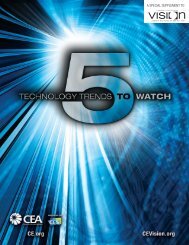Digital Display Technology - Consumer Electronics Association
Digital Display Technology - Consumer Electronics Association
Digital Display Technology - Consumer Electronics Association
- No tags were found...
Create successful ePaper yourself
Turn your PDF publications into a flip-book with our unique Google optimized e-Paper software.
Sony hit the market first in 2002, introducing online gamingfor its market-leading PlayStation 2 machines in August byhanding out console network adapters.With the popularPlayStation consoles already in 11 million homes in NorthAmerica and 30 million worldwide, Sony intends to luremany existing and potential customers to the Internet bydesigning a large batch of suitable games itself and offeringan open platform to independent game developers.Toencourage use, Sony is offering its online adventures to customersfor no charge and allowing both broadband anddial-up Internet subscribers to toy with the games.As usual, Microsoft, which entered the video game businesslate last year with its Xbox console, is taking a distinctly differentpath. Unlike Sony, Microsoft—which has sold aboutfour million Xbox machines so far, nearly all of them in theU.S.—plans to roll out its online game service Nov. 19, justbefore Thanksgiving and the start of the most frenzied partof the holiday shopping season.Also unlike Sony, Microsoftis taking a walled garden approach, creating the infrastructureand interface for game developers to use. In otherdepartures from Sony’s approach, Microsoft is charging customers$50 for its console adapter and making online playavailable to broadband users only.Nintendo is sticking its toe more slowly and cautiously intothe online waters. Nintendo, which focuses on younger gameplayers than Sony and Microsoft, aims to unveil Internetcapabilities for its GameCube machines in Japan in Octoberand in the U.S. a bit later.With about the same number ofadvanced consoles shipped and sold as Microsoft, Nintendowill sell its adapter in Japan for about $32.ONLINE VENTURES OF MAJORVIDEO GAME PLATFORMSPLATFORM CONSOLE BOX U.S. LAUNCH DATE FEESMicrosoft Xbox Nov. 19, 2002 $50 for adapterNintendo GameCube Fall 2002 $32 for adapterSony PlayStation 2 Aug. 27, 2002 No chargeSource: CEA Market Research, Sept. 2002.BROADBAND MAKES THE KEY DIFFERENCEIn their drive to go online, a large wild card for all threevideo game console developers is the extension of highspeedbroadband links to American homes.Thanks tobroadband’s wide pipes, game players can tap into onlinegames faster, compete in multi-player games easier, downloadgames to their hard-drives sooner, communicate withother gamers through text messages or voice over IP quickerand more clearly, see sharper pictures and graphics, andhear crisper sound on their console-connected TV set. It’sno wonder, then, that many console gamers already haveinvested in broadband connections.The trouble is that while broadband keeps expanding, ithas spread across the nation slower than many industryobservers had hoped.At the end of August 2002, 14 millionU.S. homes had either high-speed cable TV modem orphone DSL connections to the Internet, according toKinetic Strategies Inc.That amounts to 13 percent of allAmerican households, pretty good for a niche product butnot nearly enough for a mass-market service. So videogame hardware and software makers find themselvesdependent on two other, rival industries—cable andphone—to transform their broadband dreams into reality.If broadband does blossom as hoped, the extension of highspeedInternet connections to game consoles and TV setshas broader implications as well. For one thing, the adoptionof broadband by more gamers could spur even faster, greatergrowth for the high-speed medium, bringing fast Internet linksinto tens of millions of American homes over the next coupleof years. For another, the broadband-video game marriagecould accomplish what WebTV,AOL TV and other InternetTV devices and services have failed to do: turn the living orfamily room, rather than the den or home office, into thefamily’s prime place for tapping into the Internet.In turn, the game console box could replace the PC as thechief Internet-access device in the home and the cable orsatellite TV digital set-top box or the VCR as the family’shome entertainment center. It would then only be a matterof time before consumers could begin using their increasinglysophisticated console machines to download music,order video-on-demand (VOD) movies, play DVD videosand pursue other entertainment options.“It’s (the broadband-connectedconsole) just a likely candidate for bundlingthings like VOD or downloading software, music andmovies,” says Sean Wargo, CEA senior industry analyst.Microsoft’s Xbox already has taken a step in this futuristicdirection, incorporating a digital hard-drive and music capabilityinto its console.ONLINE GAMES: NICHE SERVICEOR MASS APPEAL?When the dust from the holiday season battle clears inearly January 2003, analysts expect the video game businessto have a modest share of online players.The consensusview is that somewhat fewer than one million gamers willsign up for online play by then, CEA’s Wargo says. IDC’sOlhava is more bearish about the initial rollouts, predictingthat slightly fewer than 600,000 video-game households willengage in online play by the start of next year.Analysts saySony will likely capture the biggest early share among thethree major rivals, thanks to its three-month head start onMicrosoft and the far greater distribution of its PlayStation2 machines.5 Technologies to Watch OCTOBER 2002 25










